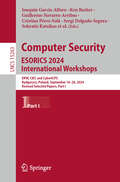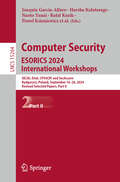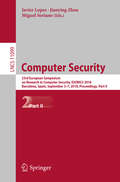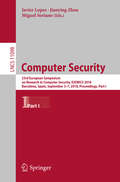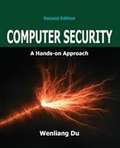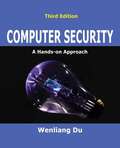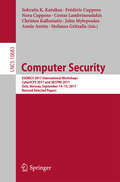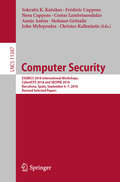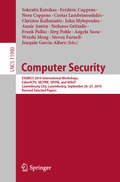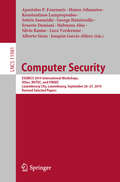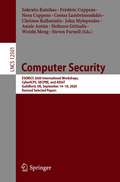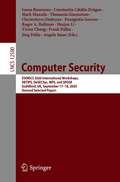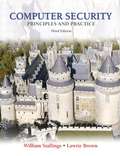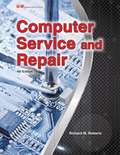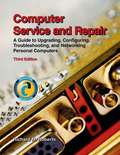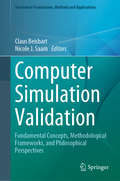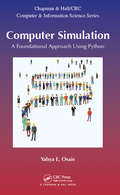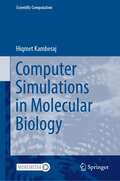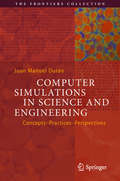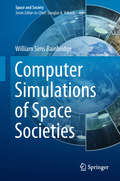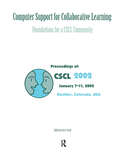- Table View
- List View
Computer Security. ESORICS 2024 International Workshops: DPM, CBT, and CyberICPS, Bydgoszcz, Poland, September 16–20, 2024, Revised Selected Papers, Part I (Lecture Notes in Computer Science #15263)
by Nora Cuppens-Boulahia Frédéric Cuppens Sokratis Katsikas Costas Lambrinoudakis Joaquin Garcia-Alfaro Guillermo Navarro-Arribas Michał Choraś Cristina Pérez-Solà Ken Barker Marek Pawlicki Sergi Delgado-SeguraThis two-volume set LNCS 15263 and LNCS 15264 constitutes the refereed proceedings of eleven International Workshops which were held in conjunction with the 29th European Symposium on Research in Computer Security, ESORICS 2024, held in Bydgoszcz, Poland, during September 16–20, 2024. The papers included in these proceedings stem from the following workshops: 19th International Workshop on Data Privacy Management, DPM 2024, which accepted 7 full papers and 6 short papers out of 24 submissions; 8th International Workshop on Cryptocurrencies and Blockchain Technology, CBT 2024, which accepted 9 full papers out of 17 submissions; 10th Workshop on the Security of Industrial Control Systems and of Cyber-Physical Systems, CyberICPS 2024, which accepted 9 full papers out of 17 submissions; International Workshop on Security and Artificial Intelligence, SECAI 2024, which accepted 10 full papers and 5 short papers out of 42 submissions; Workshop on Computational Methods for Emerging Problems in Disinformation Analysis, DisA 2024, which accepted 4 full papers out of 8 submissions; 5th International Workshop on Cyber-Physical Security for Critical Infrastructures Protection, CPS4CIP 2024, which accepted 4 full papers out of 9 submissions; 3rd International Workshop on System Security Assurance, SecAssure 2024, which accepted 8 full papers out of 14 submissions.
Computer Security. ESORICS 2024 International Workshops: SECAI, DisA, CPS4CIP, and SecAssure, Bydgoszcz, Poland, September 16–20, 2024, Revised Selected Papers, Part II (Lecture Notes in Computer Science #15264)
by Joaquin Garcia-Alfaro Silvio Ranise Michał Woźniak Michał Choraś Habtamu Abie Luca Verderame Enrico Cambiaso Rita Ugarelli Isabel Praça Basel Katt Sandeep Pirbhulal Ankur Shukla Naoto Yanai Rafał Kozik Paweł Ksieniewicz Harsha Kalutarage Marek PawlickiThis two-volume set LNCS 15263 and LNCS 15264 constitutes the refereed proceedings of eleven International Workshops which were held in conjunction with the 29th European Symposium on Research in Computer Security, ESORICS 2024, held in Bydgoszcz, Poland, during September 16–20, 2024. The papers included in these proceedings stem from the following workshops: 19th International Workshop on Data Privacy Management, DPM 2024, which accepted 7 full papers and 6 short papers out of 24 submissions; 8th International Workshop on Cryptocurrencies and Blockchain Technology, CBT 2024, which accepted 9 full papers out of 17 submissions; 10th Workshop on the Security of Industrial Control Systems and of Cyber-Physical Systems, CyberICPS 2024, which accepted 9 full papers out of 17 submissions; International Workshop on Security and Artificial Intelligence, SECAI 2024, which accepted 10 full papers and 5 short papers out of 42 submissions; Workshop on Computational Methods for Emerging Problems in Disinformation Analysis, DisA 2024, which accepted 4 full papers out of 8 submissions; 5th International Workshop on Cyber-Physical Security for Critical Infrastructures Protection, CPS4CIP 2024, which accepted 4 full papers out of 9 submissions; 3rd International Workshop on System Security Assurance, SecAssure 2024, which accepted 8 full papers out of 14 submissions.
Computer Security: 14th International Conference, Isc 2011, Xi'an, China, October 26-29, 2011, Proceedings (Lecture Notes In Computer Science / Security And Cryptology Ser. #3650)
by Javier Lopez Jianying Zhou Miguel SorianoThe two-volume set, LNCS 11098 and LNCS 11099 constitutes the refereed proceedings of the 23nd European Symposium on Research in Computer Security, ESORICS 2018, held in Barcelona, Spain, in September 2018.The 56 revised full papers presented were carefully reviewed and selected from 283 submissions. The papers address issues such as software security, blockchain and machine learning, hardware security, attacks, malware and vulnerabilities, protocol security, privacy, CPS and IoT security, mobile security, database and web security, cloud security, applied crypto, multi-party computation, SDN security.
Computer Security: 14th International Conference, Isc 2011, Xi'an, China, October 26-29, 2011, Proceedings (Lecture Notes In Computer Science / Security And Cryptology Ser. #3650)
by Javier Lopez Jianying Zhou Miguel SorianoThe two-volume set, LNCS 11098 and LNCS 11099 constitutes the refereed proceedings of the 23nd European Symposium on Research in Computer Security, ESORICS 2018, held in Barcelona, Spain, in September 2018.The 56 revised full papers presented were carefully reviewed and selected from 283 submissions. The papers address issues such as software security, blockchain and machine learning, hardware security, attacks, malware and vulnerabilities, protocol security, privacy, CPS and IoT security, mobile security, database and web security, cloud security, applied crypto, multi-party computation, SDN security.
Computer Security: A Hands-on Approach
by Wenliang DuThis book is a part of another book titled "Computer & Internet Security: A Hands-on Approach, 2nd Edition" (687 pages). It is created to lower the cost on students, as many courses only need this part. It covers 17 of the 26 chapters. This book is based on the author's 18 years of teaching and research experience. It covers the fundamental principles in Computer Security, including software security, hardware security, web security, and cryptography. Its goal is to help readers understand how various attacks work, what their fundamental causes are, how to defend against them, and how various defense mechanisms work. The book can be used as a textbook for undergraduate and graduate courses. The author strongly believes in "learning by doing", so the book takes a hands-on approach. For each security principle, the book uses a series of hands-on activities to help explain the principle; readers can "touch", play with, and experiment with the principle, instead of just reading about it. For instance, if a security principle involves an attack, the book guides readers to actually launch the attack (in a contained environment). Readers can learn better from such hands-on activities. The hands-on activities are based on the author's widely adopted SEED Labs, which have been used by over 1000 institutes in more than 65 countries.
Computer Security: A Hands-on Approach
by Wenliang DuTeaching computer security principles via hands-on activities. <p><p> Unique among computer security texts, this book, in its third edition, builds on the author’s long tradition of teaching complex subjects through a hands-on approach. For each security principle, the book uses a series of hands-on activities to help explain the principle. Readers can "touch," play with, and experiment with the principle, instead of just reading about it. The hands-on activities are based on the author's widely adopted SEED Labs, which have been used by over 1000 institutes worldwide. The author has also published online courses on Udemy based on this book.
Computer Security: ESORICS 2017 International Workshops, CyberICPS 2017 and SECPRE 2017, Oslo, Norway, September 14-15, 2017, Revised Selected Papers (Lecture Notes in Computer Science #10683)
by John Mylopoulos Frédéric Cuppens Costas Lambrinoudakis Sokratis K. Katsikas Nora Cuppens Christos Kalloniatis Annie Antón Stefanos GritzalisIn this e-book, authors address aspects of security and privacy issues of IT outsourcing. Paper 1 describes the fundamental aspects of IS/IT security outsourcing and introduces the specific organizational, technical and legal issues that should be considered for making an outsourcing arrangement. It also examines privacy issues and suggests how outsourcing arrangements can comply with these requirements. Paper 2 describes a process for outsourcing a security information management platform. Paper 3 discusses the problems of client-generated digital signatures and proposes a framework for outsourcing digital signatures to a Trusted Third Party.
Computer Security: ESORICS 2018 International Workshops, CyberICPS 2018 and SECPRE 2018, Barcelona, Spain, September 6–7, 2018, Revised Selected Papers (Lecture Notes in Computer Science #11387)
by John Mylopoulos Frédéric Cuppens Costas Lambrinoudakis Sokratis K. Katsikas Nora Cuppens Christos Kalloniatis Annie Antón Stefanos GritzalisThis book constitutes the thoroughly refereed post-conference proceedings of the 4th International Workshop on the Security of Industrial Control Systems and Cyber-Physical Systems, CyberICPS 2018, and the Second International Workshop on Security and Privacy Requirements Engineering, SECPRE 2018, held in Barcelona, Spain, in September 2018, in conjunction with the 23rd European Symposium on Research in Computer Security, ESORICS 2018. The CyberICPS Workshop received 15 submissions from which 8 full papers were selected for presentation. They cover topics related to threats, vulnerabilities and risks that cyber-physical systems and industrial control systems face; cyber attacks that may be launched against such systems; and ways of detecting and responding to such attacks. From the SECPRE Workshop 5 full papers out of 11 submissions are included. The selected papers deal with aspects of security and privacy requirements assurance and evaluation; and security requirements elicitation and modelling.
Computer Security: ESORICS 2019 International Workshops, CyberICPS, SECPRE, SPOSE, and ADIoT, Luxembourg City, Luxembourg, September 26–27, 2019 Revised Selected Papers (Lecture Notes in Computer Science #11980)
by John Mylopoulos Steven Furnell Frédéric Cuppens Sokratis Katsikas Costas Lambrinoudakis Joaquin Garcia-Alfaro Nora Cuppens Christos Kalloniatis Annie Antón Stefanos Gritzalis Weizhi Meng Frank Pallas Jörg Pohle Angela SasseThis book constitutes the refereed post-conference proceedings of the 5th International Workshop on Security of Industrial Control Systems and Cyber-Physical Systems, CyberICPS 2019, the Third International Workshop on Security and Privacy Requirements Engineering, SECPRE 2019, the First International Workshop on Security, Privacy, Organizations, and Systems Engineering, SPOSE 2019, and the Second International Workshop on Attacks and Defenses for Internet-of-Things, ADIoT 2019, held in Luxembourg City, Luxembourg, in September 2019, in conjunction with the 24th European Symposium on Research in Computer Security, ESORICS 2019. The CyberICPS Workshop received 13 submissions from which 5 full papers and 2 short papers were selected for presentation. They cover topics related to threats, vulnerabilities and risks that cyber-physical systems and industrial control systems face; cyber attacks that may be launched against such systems; and ways of detecting and responding to such attacks. From the SECPRE Workshop 9 full papers out of 14 submissions are included. The selected papers deal with aspects of security and privacy requirements assurance and evaluation; and security requirements elicitation and modelling and to GDPR compliance. The SPOSE Workshop received 7 submissions from which 3 full papers and 1 demo paper were accepted for publication. They demonstrate the possible spectrum for fruitful research at the intersection of security, privacy, organizational science, and systems engineering.From the ADIoT Workshop 5 full papers and 2 short papers out of 16 submissions are included. The papers focus on IoT attacks and defenses and discuss either practical or theoretical solutions to identify IoT vulnerabilities and IoT security mechanisms.
Computer Security: ESORICS 2019 International Workshops, IOSec, MSTEC, and FINSEC, Luxembourg City, Luxembourg, September 26–27, 2019, Revised Selected Papers (Lecture Notes in Computer Science #11981)
by Joaquin Garcia-Alfaro Silvio Ranise Ernesto Damiani Sotiris Ioannidis Apostolos P. Fournaris Konstantinos Lampropoulos Manos Athanatos George Hatzivasilis Habtamu Abie Luca Verderame Alberto SienaThis book constitutes the refereed post-conference proceedings of the Second International Workshop on Information & Operational Technology (IT & OT) security systems, IOSec 2019 , the First International Workshop on Model-driven Simulation and Training Environments, MSTEC 2019, and the First International Workshop on Security for Financial Critical Infrastructures and Services, FINSEC 2019, held in Luxembourg City, Luxembourg, in September 2019, in conjunction with the 24th European Symposium on Research in Computer Security, ESORICS 2019. The IOSec Workshop received 17 submissions from which 7 full papers were selected for presentation. They cover topics related to security architectures and frameworks for enterprises, SMEs, public administration or critical infrastructures, threat models for IT & OT systems and communication networks, cyber-threat detection, classification and pro ling, incident management, security training and awareness, risk assessment safety and security, hardware security, cryptographic engineering, secure software development, malicious code analysis as well as security testing platforms. From the MSTEC Workshop 7 full papers out of 15 submissions are included. The selected papers deal focus on the verification and validation (V&V) process, which provides the operational community with confidence in knowing that cyber models represent the real world, and discuss how defense training may benefit from cyber models. The FINSEC Workshop received 8 submissions from which 3 full papers and 1 short paper were accepted for publication. The papers reflect the objective to rethink cyber-security in the light of latest technology developments (e.g., FinTech, cloud computing, blockchain, BigData, AI, Internet-of-Things (IoT), mobile-first services, mobile payments).
Computer Security: ESORICS 2020 International Workshops, CyberICPS, SECPRE, and ADIoT, Guildford, UK, September 14–18, 2020, Revised Selected Papers (Lecture Notes in Computer Science #12501)
by John Mylopoulos Steven Furnell Frédéric Cuppens Sokratis Katsikas Costas Lambrinoudakis Nora Cuppens Christos Kalloniatis Annie Antón Stefanos Gritzalis Weizhi MengThis book constitutes the refereed post-conference proceedings of the 6th International Workshop on Security of Industrial Control Systems and Cyber-Physical Systems, CyberICPS 2020, the Second International Workshop on Security and Privacy Requirements Engineering, SECPRE 2020, and the Third International Workshop on Attacks and Defenses for Internet-of-Things, ADIoT 2020, held in Guildford, UK, in September 2020 in conjunction with the 25th European Symposium on Research in Computer Security, ESORICS 2020. Due to COVID-19 pandemic the conference was held virtually The CyberICPS Workshop received 21 submissions from which 5 full papers were selected for presentation. They cover topics related to threats, vulnerabilities and risks that cyber-physical systems and industrial control systems face; cyberattacks that may be launched against such systems; and ways of detecting and responding to such attacks. From the SECPRE Workshop 4 full papers out of 7 submissions are included. The selected papers deal with aspects of security and privacy requirements assurance and evaluation; and security requirements elicitation and modelling and to GDPR compliance. From the ADIoT Workshop 2 full papers and 2 short papers out of 12 submissions are included. The papers focus on IoT attacks and defenses and discuss either practical or theoretical solutions to identify IoT vulnerabilities and IoT security mechanisms.
Computer Security: ESORICS 2020 International Workshops, DETIPS, DeSECSys, MPS, and SPOSE, Guildford, UK, September 17–18, 2020, Revised Selected Papers (Lecture Notes in Computer Science #12580)
by Shujun Li Mark Manulis Victor Chang Ioana Boureanu Frank Pallas Jörg Pohle Angela Sasse Thanassis Giannetsos Constantin Cătălin Drăgan Christoforos Dadoyan Panagiotis Gouvas Roger A. HallmanThis book constitutes the refereed post-conference proceedings of the Interdisciplinary Workshop on Trust, Identity, Privacy, and Security in the Digital Economy, DETIPS 2020; the First International Workshop on Dependability and Safety of Emerging Cloud and Fog Systems, DeSECSys 2020; Third International Workshop on Multimedia Privacy and Security, MPS 2020; and the Second Workshop on Security, Privacy, Organizations, and Systems Engineering, SPOSE 2020; held in Guildford, UK, in September 2020, in conjunction with the 25th European Symposium on Research in Computer Security, ESORICS 2020. A total of 42 papers was submitted. For the DETIPS Workshop 8 regular papers were selected for presentation. Topics of interest address various aspect of the core areas in relation to digital economy. For the DeSECSys Workshop 4 regular papers are included. The workshop had the objective of fostering collaboration and discussion among cyber-security researchers and practitioners to discuss the various facets and trade-o s of cyber security. In particular, applications, opportunities and possible shortcomings of novel security technologies and their integration in emerging application domains. For the MPS Workshop 4 regular papers are presented which cover topics related to the security and privacy of multimedia systems of Internet-based video conferencing systems (e.g., Zoom, Microsoft Teams, Google Meet), online chatrooms (e.g., Slack), as well as other services to support telework capabilities. For the SPOSE Workshop 3 full papers were accepted for publication. They reflect the discussion, exchange, and development of ideas and questions regarding the design and engineering of technical security and privacy mechanisms with particular reference to organizational contexts.
Computer Security: Principles and Practice
by William Stallings Lawrie BrownComputer Security: Principles and Practice, Third Edition, is ideal for courses in Computer/Network Security. It also provides a solid, up-to-date reference or self-study tutorial for system engineers, programmers, system managers, network managers, product marketing personnel, system support specialists. In recent years, the need for education in computer security and related topics has grown dramatically--and is essential for anyone studying Computer Science or Computer Engineering. This is the only text available to provide integrated, comprehensive, up-to-date coverage of the broad range of topics in this subject In addition to an extensive pedagogical program, the book provides unparalleled support for both research and modeling projects, giving students a broader perspective It covers all security topics considered Core in the EEE/ACM Computer Science Curriculum. This textbook can be used to prep for CISSP Certification, and includes in-depth coverage of Computer Security, Technology and Principles, Software Security, Management Issues, Cryptographic Algorithms, Internet Security and more. The Text and Academic Authors Association named Computer Security: Principles and Practice, First Edition, the winner of the Textbook Excellence Award for the best Computer Science textbook of 2008. Teaching and Learning Experience This program presents a better teaching and learning experience--for you and your students. It will help: Easily Integrate Projects in your Course: This book provides an unparalleled degree of support for including both research and modeling projects in your course, giving students a broader perspective Keep Your Course Current with Updated Technical Content: This edition covers the latest trends and developments in computer security. Enhance Learning with Engaging Features: Extensive use of case studies and examples provides real-world context to the text material. Provide Extensive Support Material to Instructors and Students: Student and instructor resources are available to expand on the topics presented in the text.
Computer Service And Repair, 4th Edition
by Richard M. RobertsComputer Service and Repair is written for those who have no PC experience, as well as those technicians who have limited formal training. Written in an easy-to-understand format with hundreds of illustrations, Computer Service and Repair takes the reader from basic instruction to test preparation for the CompTIA A+ Certification exams. For those who want to learn computer networking, programming, administration, or any of the computer sciences, Computer Service and Repair is the perfect place to start.
Computer Service and Repair: A Guide to Upgrading, Configuring, Troubleshooting, and Networking Personal Computers
by Richard M. RobertsTeaches the practices and principles needed to pass the A+ Certification Exams, as well as to build, upgrade, and troubleshoot your PC.
Computer Simulation Validation: Fundamental Concepts, Methodological Frameworks, and Philosophical Perspectives (Simulation Foundations, Methods and Applications)
by Claus Beisbart Nicole J. SaamThis unique volume introduces and discusses the methods of validating computer simulations in scientific research. The core concepts, strategies, and techniques of validation are explained by an international team of pre-eminent authorities, drawing on expertise from various fields ranging from engineering and the physical sciences to the social sciences and history. The work also offers new and original philosophical perspectives on the validation of simulations.Topics and features: introduces the fundamental concepts and principles related to the validation of computer simulations, and examines philosophical frameworks for thinking about validation; provides an overview of the various strategies and techniques available for validating simulations, as well as the preparatory steps that have to be taken prior to validation; describes commonly used reference points and mathematical frameworks applicable to simulation validation; reviews the legal prescriptions, and the administrative and procedural activities related to simulation validation; presents examples of best practice that demonstrate how methods of validation are applied in various disciplines and with different types of simulation models; covers important practical challenges faced by simulation scientists when applying validation methods and techniques; offers a selection of general philosophical reflections that explore the significance of validation from a broader perspective.This truly interdisciplinary handbook will appeal to a broad audience, from professional scientists spanning all natural and social sciences, to young scholars new to research with computer simulations. Philosophers of science, and methodologists seeking to increase their understanding of simulation validation, will also find much to benefit from in the text.
Computer Simulation: A Foundational Approach Using Python (Chapman & Hall/CRC Computer and Information Science Series)
by Yahya Esmail OsaisComputer simulation is an effective and popular universal tool that can be applied to almost all disciplines. Requiring only basic knowledge of programming, mathematics, and probability theory, Computer Simulation: A Foundational Approach Using Python takes a hands-on approach to programming to introduce the fundamentals of computer simulation. The main target of the book is computer science and engineering students who are interested mainly in directly applying the techniques to their research problems. The book will be of great interest to senior undergraduate and starting graduate students in the fields of computer science and engineering and industrial engineering.
Computer Simulations in Molecular Biology (Scientific Computation)
by Hiqmet KamberajThis book covers a range of topics in quantum mechanics and molecular dynamics simulation, including computational modeling and machine learning approaches. The book also provides a Python GUI and tutorials for simulating molecular biological systems and presents case studies of quantum mechanics simulations for predicting electronic properties. Its pedagogical formatting makes it easy for students to understand and follow and has been praised for providing clear and detailed explanations of complex topics. This book is ideal for graduate students and researchers in theoretical and computational biophysics, physics, chemistry, and materials science, as well as postgraduates in applied mathematics, computer science, and bioinformatics.
Computer Simulations in Science and Engineering: Concepts - Practices - Perspectives (The Frontiers Collection)
by Juan Manuel DuránThis book addresses key conceptual issues relating to the modern scientific and engineering use of computer simulations. It analyses a broad set of questions, from the nature of computer simulations to their epistemological power, including the many scientific, social and ethics implications of using computer simulations. The book is written in an easily accessible narrative, one that weaves together philosophical questions and scientific technicalities. It will thus appeal equally to all academic scientists, engineers, and researchers in industry interested in questions (and conceivable answers) related to the general practice of computer simulations.
Computer Simulations of Space Societies (Space and Society)
by William Sims BainbridgeAt the intersection of astronautics, computer science, and social science, this book introduces the challenges and insights associated with computer simulation of human society in outer space, and of the dynamics of terrestrial enthusiasm for space exploration. Never before have so many dynamic representations of space-related social systems existed, some deeply analyzing the logical implications of social-scientific theories, and others open for experience by the general public as computer-generated virtual worlds. Fascinating software ranges from multi-agent artificial intelligence models of civilization, to space-oriented massively multiplayer online games, to educational programs suitable for schools or even for the world's space exploration agencies. At the present time, when actual forays by humans into space are scarce, computer simulations of space societies are an excellent way to prepare for a renaissance of exploration beyond the bounds of Earth.
Computer Studies Part 1 class 10 - GSTB
by Gujarat State Board of School TextbooksThe Gujarat State Secondary and Higher Secondary Education Board has prepared new syllabi based on the open-source operating system and compatible open-source software tools for various topics of Computer Studies. These syllabi are sanctioned by the Government of Gujarat. The Part 1 of the textbook contains chapters 1 to 7.
Computer Studies Part 2 class 10 - GSTB
by Gujarat State Board of School TextbooksThe Gujarat State Secondary and Higher Secondary Education Board has prepared new syllabi based on the open-source operating system and compatible open-source software tools for various topics of Computer Studies. These syllabi are sanctioned by the Government of Gujarat. The Part 1 of the textbook contains chapters 8 to 16 and appendix 1 to 4.
Computer Studies class 11 - GSTB
by Gujarat State Board of School TextbooksWritten in simple english language, the Gujarat State Secondary and Higher Secondary Education Board has prepared new syllabi for class 11 based on the open source operating system and compatible open source software tools for various topics of Computer Studies. These syllabi are sanctioned by the Government of Gujarat.
Computer Studies class 9 - GSTB
by Gujarat State Board of School TextbooksThe Gujarat State Secondary and Higher Secondary Education Board has prepared new syllabi based on the open source operating system and compatible open source software tools for various topics of Computer Studies. These syllabi are sanctioned by the Government of Gujarat. It is a matter of pleasure for the Gujarat State Board of School Textbooks to place this textbook of Computer Studies before the students of Standard 9 prepared according to the new syllabus.
Computer Support for Collaborative Learning: Foundations for A Cscl Community (cscl 2002 Proceedings)
by Gerry StahlComputer Support for Collaborative Learning (CSCL) is a field of study centrally concerned with meaning and the practices of meaning-making in the context of joint activity, and the ways in which these practices are mediated through designed artifacts. This volume includes abstracts of papers that were presented during interactive poster sessions at CSCL 2002. Documenting an extremely heterogeneous, productive phase of inquiry with broad social consequences, these proceedings reflect the current state of CSCL research--particularly in North America and Western Europe.
